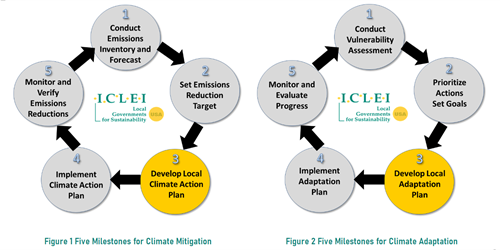Continuously measure, evaluate, and address both mitigation and adaptation progress in accordance with ICLEI Local Governments for Sustainability, USA Five Milestones for Climate Mitigation and Adaptation
Sustainability is an ongoing process. Communities must celebrate their successes while continuing to pursue further emission reductions and resilience improvements. While Clearwater has already begun to reduce GHG emissions and climate risk through a variety of actions, it must continuously measure, evaluate, and address both mitigation and adaptation progress. Thankfully, two approaches to achieve this ongoing work have been developed by the International Council for Local Environmental Initiatives (ICLEI). These are known as the Five Milestones for Climate Mitigation and Adaptation.

Furthermore, tracking the success of existing and future green initiatives is a vitally important component of Clearwater Greenprint. To lead by example, the city will continue to highlight its green initiatives and report the associated benefits. Environmental, economic, and social metrics will be collected and reported. The benefits, costs, and lessons learned of the various efforts will be shared with the Clearwater community as well as other local governments through the Sustainability & Resilience website. Furthermore, the city will commit to conducting a GHG inventory every two years to assess progress.